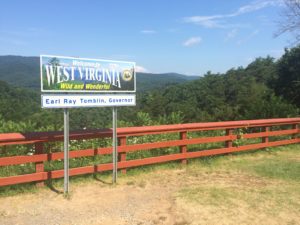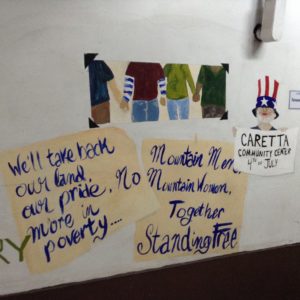In mid-July of 2017, a group of teenagers and adults from the UU Church of Delaware County will visit West Virginia on a UUCSJ Youth Service Journey. In part of the preparation for this pilot program, last week I had the immense pleasure of visiting West Virginia, and meeting with a host of congregations, faith leaders, organizations and activists.
 I have to admit, upon planning for this trip, I found myself feeling a range of emotions: intrigued, nervous, romanticizing. Like few other places in the country, West Virginia has come to stand for something very deeply entrenched in our national psyche. It has been heralded as the “home of coal,” and post-election we heard endless analyses of the state of the “white working class” and how on earth they could turn out in such large numbers for someone like Donald Trump. On the other hand, folks in West Virginia often refer to themselves as a “third world country” and as a “national sacrifice zone.”
I have to admit, upon planning for this trip, I found myself feeling a range of emotions: intrigued, nervous, romanticizing. Like few other places in the country, West Virginia has come to stand for something very deeply entrenched in our national psyche. It has been heralded as the “home of coal,” and post-election we heard endless analyses of the state of the “white working class” and how on earth they could turn out in such large numbers for someone like Donald Trump. On the other hand, folks in West Virginia often refer to themselves as a “third world country” and as a “national sacrifice zone.”
It’s clear that there is something at stake in engaging with West Virginia.
One of the first things I noticed upon getting there was the strange fact that West Virginians are on the one hand deeply skeptical of “outsiders” who have come to “do good,” and on the other hand so friendly and hospitable.
They have reason to be skeptical: in the past 100 years, West Virginians have been viciously exploited and plundered by coal companies, northern banks and corrupt politicians. They have watched their breathtaking mountains be destroyed and their water contaminated, their wealth and natural wonders siphoned away to feed the insatiable hunger for national and global progress. And as the coal boom has ended, they have been abandoned. Resources and jobs have fled, and Democrats and Republicans alike have come along with a string of empty promises. The dignity that comes with a job, a community and knowing you are making meaningful contributions to society has withered way, and in that vacuum these same coal companies and political ideologues have imported an insidious narrative of white supremacy and vapid nationalism.
 But there is another side I witnessed: West Virginia wasn’t always “white”, and wasn’t always poor, it has a long history of multi-racial activism led by the most affected (especially in coal mining unions), a long history of people fighting for dignity, diversity and sustainable development. And now, in the face of vicious inequality and environmental disaster, ordinary people are coming together to fight for their mountains, their water, their state and for their future.
But there is another side I witnessed: West Virginia wasn’t always “white”, and wasn’t always poor, it has a long history of multi-racial activism led by the most affected (especially in coal mining unions), a long history of people fighting for dignity, diversity and sustainable development. And now, in the face of vicious inequality and environmental disaster, ordinary people are coming together to fight for their mountains, their water, their state and for their future.
I was so deeply moved by all the people I met and learned about, from the justice work, wisdom and commitment of the UU Congregation of Charleston, to the small but mighty New River UU Fellowship trying to put their faith into action, to UUSC partner Legal Aid of West Virginia offering legal support to the down and out, to grassroots organizations like RiseUp West Virginia, Refresh Appalachia, Our Water, WV Environmental Council, the WV Hub and countless others trying to organize for peace and justice. I was so grateful to be part of an Appalachian-wide interfaith gathering as they wrestled with huge questions while trying to lay the foundations for a multi-faith organization to help build a new Appalachia from among the ruins. Lastly, I was so inspired by two rural organizations UUCSJ will be partnering with who are both doing heroic work empowering rural West Virginians: Big Creek People in Action and the Southern Appalachia Labor School.
The UUCSJ Youth Service Journey will offer youth the experience I had: to learn this tragic and complex history, to meet these incredible people, to hear about the contemporary struggles of “third world America,” and to work alongside these folks and witness the tremendous efforts they are making to build their own future and maintain their dignity. It is our hope that this journey will provide a learning experience that goes way beyond the local issues faced by West Virginia and Appalachia. As Rev. Mel Hoover said to me, “So goes West Virginia, so goes America.”
By joining in the effort to build a just, sustainable, inclusive Appalachia, we can help build a just, sustainable, inclusive America (and by extension… world!).
Chris Casuccio, Senior Associate for Immersion Learning

